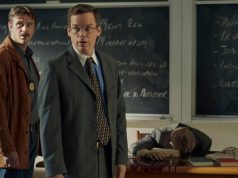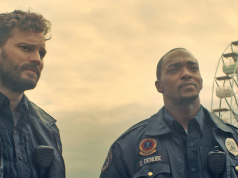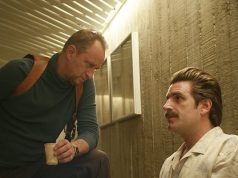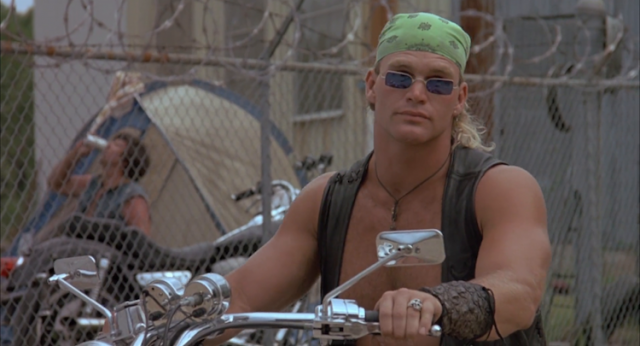
Brian Bosworth was a football star at the University of Oklahoma in the mid 1980s before spending two disappointing years with the Seattle Seahawks. He followed this with a disastrous movie career, starting with “Stone Cold” in 1991. Through it all he was known for his controversial behavior and arrogance — known by people other than me, that is. My knowledge of 1980s football players is minimal (though my knowledge of 1980s TV theme songs is unrivaled). This is too bad, because if I’d known what a jerk Bosworth was before I watched “Stone Cold,” I’d have disliked it even more, and I would have enjoyed that.
“Stone Cold” is not, unfortunately, a documentary about the Cold Stone chain of ice cream parlors. Instead, it’s about a redneck cop who infiltrates a gang of bikers, who are also rednecks, whereupon a great many redneck-oriented things occur. All of this takes place, I need hardly point out, in Mississippi. The biker gang, called the Brotherhood, is shown cavorting in the manner you’d expect: leather-skinned men in Confederate flag T-shirts drink Dixie beer while fist-fighting one another as plump, loud women with meth-rotted teeth cheer them on. Whether the film was actually shot in Mississippi or simply at the nearest Wal-Mart, I don’t know.
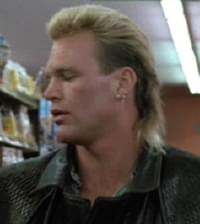
The cop is named Joe Huff, and he is portrayed, if that is the term I’m looking for, by Brian Bosworth, a bulky himbo whose bleach-blond hair has been fashioned, if that is the term I’m looking for, into an unruly mullet. We meet Huff when he single-handedly resolves a hostage crisis in a supermarket (just like in Sylvester Stallone’s “Cobra”!) despite being on suspension for insubordination. Huff, it turns out, is a very, very rare kind of movie cop, the sort you almost never see in films: He’s a loose cannon who doesn’t play by the rules, and although his superior officers bluster and rant about his methods, they can’t deny he gets results. This behavior is so different from the typical movie cop, who tends to be obedient and meek and by-the-book, that I wonder why it hasn’t been duplicated in one hundred thousand other cop movies. WEIRD.
Anyway, Huff has arrested a lot of bikers in his career, so the FBI comes to him when they start having trouble with the Brotherhood. (Why it takes any particular skill or finesse to arrest a biker, the movie doesn’t say. One assumes Huff produces pheromones that attract bikers to him, thus allowing him to ensnare them.) The Brotherhood has been killing pastors and ministers lately, and when one of their own was convicted of one of the murders, the Brotherhood killed the judge who tried him. The FBI’s tolerance for this sort of thing is limited.
Huff chooses John Stone as his undercover name, hence (I guess) the title “Stone Cold.” He gets into the Brotherhood’s good graces by hanging out at their favorite strip club and interacting with them in their native language, i.e., through aggression, anger, and general dirtbaggery. The Brotherhood all have nicknames like Ice, Chains, Gut, Tool, and Mudfish, none of which I am making up. Ice (William Forsythe) is a little wary of Stone, which he conveys by referring to Stone as “pretty” no fewer than four times in one scene. I’m not making that up, either. Not that I question Stone’s loveliness — he looks like a young Kurt Russell, if Kurt Russell had a debilitating steroid habit — but I do wonder at the wisdom of pointing out Stone’s beauty, especially in mocking terms, upon first meeting him. If nothing else, it’s poor etiquette.
Ice’s low, or possibly very high, opinion of Stone doesn’t matter to the group’s leader, Chains (Lance Henriksen), 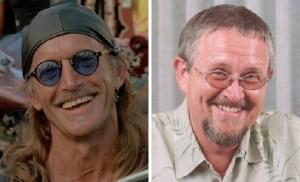 who commands fear and respect within the Brotherhood even though he wears tiny sunglasses and looks like Orson Scott Card. Chains likes the cut of Stone’s jib, or whatever the biker equivalent of that expression would be. He senses that Stone is dangerous, maybe even stupid, but he sees him as a potential asset to the organization. In his own words: “This is either gonna be the biggest pork chop I ever ate, or my bulldozer.” That is a direct quote from Chains regarding Stone, and I defy you to say it any better, or to explain what it means.
who commands fear and respect within the Brotherhood even though he wears tiny sunglasses and looks like Orson Scott Card. Chains likes the cut of Stone’s jib, or whatever the biker equivalent of that expression would be. He senses that Stone is dangerous, maybe even stupid, but he sees him as a potential asset to the organization. In his own words: “This is either gonna be the biggest pork chop I ever ate, or my bulldozer.” That is a direct quote from Chains regarding Stone, and I defy you to say it any better, or to explain what it means.
The Brotherhood is involved in the distribution of drugs, which is what I tend to assume most people who ride motorcycles are doing. (I know this is unfair. Sue me.) To see if Stone is up to the task of being a full-fledged Brother, Chains assigns him to kill a particular snitch and bring back his ear. Stone, being a cop, can’t just go around killing people, though — well, not until later, when the plot requires it, at which point he can kill about a dozen people in 10 minutes — so the FBI helps him get an ear from a cadaver and tattoo it to resemble the snitch’s distinctive ear. The actual snitch is sent out of the country and warned never to return. Whew! There’s no way that’s gonna come back later and bite Stone in the butt!
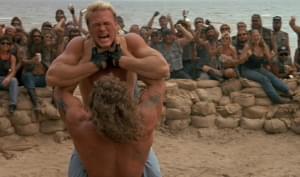
Chains has a girlfriend named Nancy (Arabella Holzbog) whom he offers to Stone as a gift, but Stone declines because Stone is respectful of women. Eventually Stone and Nancy hook up anyway — no woman can resist the Boz, and the Boz can resist no woman — and she’s the one who figures out he’s a cop. This is around the same time that Chains kills a couple of National Guardsmen, which horrifies the Brotherhood, because apparently the rank-and-file membership wasn’t aware that the Brotherhood engaged in murder. Drug dealing, sure. But killing people? That wasn’t in the club charter. I wouldn’t be a bit surprised if the Brotherhood holds a recall election to oust Chains as their leader.
The Brotherhood’s big plan, which everyone goes along with after all, is to invade the courthouse where their fellow Brother is being sentenced and rescue him. Despite the heavy security — you’ll recall that a judge connected to this case was murdered — the Brotherhood succeeds at this very easily, which should lift the spirits of any young malcontent who was thinking of besieging a courthouse but feared it would be impossible. Stone, meanwhile, his cover blown (the snitch came back and tattled, by the way, in an unforeseeable twist), is tied up in a helicopter that the Brotherhood plans to explode. Stone escapes not by hatching a clever plan or distracting the Brothers who guard him, but simply by breaking out of the ropes — through sheer brute strength, in other words. His brains are as unnecessary as they are mulleted.
The courthouse siege is a total bloodbath, with dozens of casualties on both sides. Pretty much every character in the movie who had a speaking part is dead by the time it’s over, in a display of carnage so senseless you’d think Michael Bay had directed it. At no point in the film does Brian Bosworth say or do anything funny, interesting, memorable, or cool. In fact, even though I just watched it, I can’t say with absolute certainty that Brian Bosworth does anything in it. The movie just sort of happens around him. It’s as if the filmmakers found the perfect spot on which to produce something loud and moronic, and the only drawback was that an inert meathead was permanently installed as part of the landscape, so they had to find creative ways of including him in the action. They did a pretty good job, though. In many scenes he appears almost lifelike.
— Film.com


